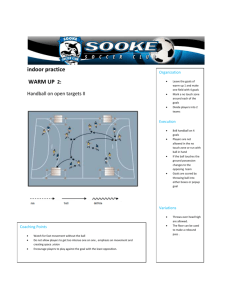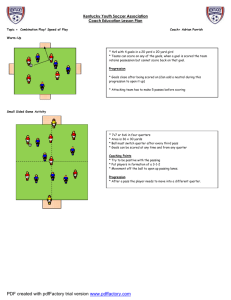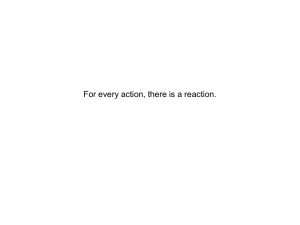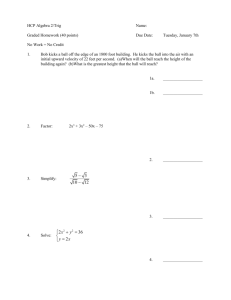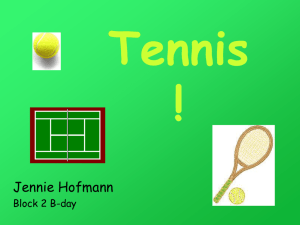AI for games lecture 2
advertisement
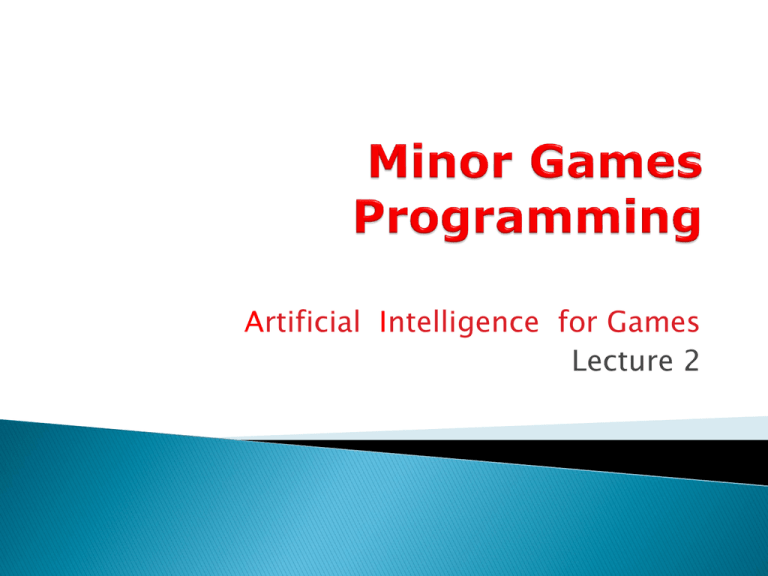
Artificial Intelligence for Games Lecture 2 2D sports simulation (no interactive player) 2 teams (“red” and “blue”) 5 autonomous agents per team ◦ 4 field players ◦ 1 goal keeper 1 field (“pitch”) 2 goals 1 ball Red Team: BucklandTeam Blue Team: WindTeam Keyboard controls ◦ P for pause/resume ◦ R for reset (new match) Frame (update) rate ◦ default 60 Hz (FrameRate in Params.ini) ◦ can slow down to study behavior more closely Match ◦ default 5 min (TimeLimit in Params.ini) ◦ scoring bonus for using less CPU time (details later) Geometry and Physics ◦ steering ◦ navigation Tiered AI ◦ overall team state machine ◦ each player has state machine ◦ each player has (changing) role in team e.g., pass receiver ◦ messaging between players e.g., “pass me the ball” Like many other genres (e.g., FPS), AI opponents in sports simulations must be beatable • AI’s may have inherently weak strategies (e.g,. no defensive plays in Simple Soccer) Inaccurate (approximate) physics modeling • saves compute time, but causes AI’s to make mistakes • e.g., circles instead of ellipses to calculate interception in Simple Soccer •ball rebounds off walls •no corners or throw-ins •no off-side rules •No “head” moves As aid to implementing strategies, pitch divided into 18 regions (numbered 0-17 as above) Each player has a “home region” • starting point for match • may change during play Three elementary kinematic equations ◦ v = u + at ◦ d = ut + ½ at2 (speed) (distance) Dynamics: F = ma Acceleration (a) is Friction in Params.ini Soccer ball only checks for collision with pitch boundaries ◦ angle of incidence equals angle of reflection ◦ ball moves freely through players “feet” This Page is Read-Only In reality: ◦ player swings foot toward moving ball ◦ force on ball at moment of collision with foot changes velocity of ball Approximation in game: ◦ pretend ball stopped at moment of kick ◦ player gives ball fixed initial velocity ◦ easier to calculate ◦ looks ok Receiving Player ◦ waiting to receive kicked ball ◦ may be null Closest Player to the Ball ◦ updated every tick ◦ never null Controlling Player ◦ more contextual: passer, receiver, attacker ◦ may be null Supporting Player ◦ works with controlling player ◦ always defined when controlling player defined ◦ May need to extend these to improve team strategy! possible destinations for supporting player in opposing half-pitch (default 13x6) each rated for (weights in Params.ini): ◦ safe passing (Spot_PassSafeScore) ◦ goal scoring potential (Spot_CanScoreFromPositionSc ore) ◦ distance from controlling player ◦ (Spot_DistFromControllingPlay erScore) The spots are scored by examining each one in turn and scoring them for a particular quality, such as whether or not a goal is possible from the spot's position or how far away from the controlling player the spot is situated. The scores for each quality are accumulated and the spot with the highest score is marked as the best supporting spot. Non-agent entities: ◦ Soccer pitch ◦ Goal ◦ Soccer ball ◦ Support spot calculator ◦ Main loop entered ◦ start of match ◦ after goal scored sends all players to (defending) home regions “waits” until all players are home transitions to Defending state change home regions to blue (defending) set steers all field players to homes if team gets control, transition to Attacking change home regions to red (attacking) set choose supporting player / spot if team loses control, transition to Defending handles all messages between players ◦ Msg_SupportAttacker ◦ Msg_GoHome ◦ Msg_ReceiveBall ◦ Msg_PassToMe ◦ Msg_Wait no messages between team and players in this implementation turn on “seek” steering to ball’s current position if in kicking range, transition to KickBall if no longer closest player, ReturnToHomeRegion turn off “seek” when exiting hold position at current steering target if upfield of teammate in control, send Msg_PassToMe to controlling player if closest to ball and no current receiver (and goalie does not have ball), transition to ChaseBall entered in response to Msg_ReceiveBall ◦ telegram contains target location of ball ◦ at most one player on team in this state choose between “arrive” vs. “pursuit” steering towards ball ◦ always use “arrive” if close to goal or threatened ◦ otherwise, random variation if close enough to ball or team loses control, transition to ChaseBall if max kicks/sec exceeded or goalie has ball, transition to ChaseBall if CanShoot (see later), Ball()->Kick() ◦ transition to Wait ◦ assign supporting player and send Msg_SupportAttacker else if threatened and CanPass (see later) ◦ assign receiver and send Msg_ReceiveBall otherwise, transition to Dribble ◦ assign supporting player and send Msg_SupportAttacker turn upfield if necessary (maintaining control of ball) repeat ◦ kick ball short distance ◦ transition to ChaseBall ◦ which will transition to KickBall ◦ which will transition to Dribble steer (“arrive on”) to selected support spot ◦ support spot re-evaluated every update if CanShoot and not threatened, then send Msg_PassToMe to controlling player (attacker) if cannot request pass, then remain at support spot and “track” (face) ball if team loses control, transition to ReturnToHomeRegion always faces ball steering behaviors use velocity-aligned heading so moving and facing directions can be different handles two messages ◦ Msg_GoHome ◦ Msg_ReceiveBall using “interpose” steering to keep body between ball and rear of goal if ball comes within control range, transition to PutBallBackInPlay if ball comes within intercept range, transition to InterceptBall send Msg_ReturnHome to all field players (including opponents!) pass to teammate transition to TendGoal steer towards ball using “pursuit” if close enough to trap ball transition to PutBallBackInPlay if move too far from goal ◦ unless goalie is closest player to ball ◦ transition to ReturnHome isPassSafeFromAllOpponents CanShoot FindPass GetBestPasstoReceiver direct pass ◦ assume kicked ball speed > max player speed ◦ then any player “behind” kicker is safe ◦ how to calculate “behind” ? transform to local coordinates of kicker all opponents (e.g., W) with negative x coordinate are “behind” kick (i.e., safe) how about opponents beyond receiver (x coordinate > B), e.g., Q ? if distance to receiver (BQ) is greater than pass distance (AB), then safe how to eliminate remaining opponents? compute closest intercept point (e.g, Xp, Yp) compare time for ball vs. opponent to reach intercept point ◦ adjustment for ball size and capture distance ◦ ignoring time for opponent to rotate choose random points along back of goal call isPassSafeFromAll Opponents call GetBestPassToReceiver on each teammate beyond MinPassingDistance choose teammate who can safely receive pass that is furthest upfield eliminate if receiver too far ◦ doesn’t consider receiver running toward passer consider “side passes” compute range (dotted circle) of receiver within time duration of pass side pass targets are ip1 and ip2 ◦ check that inside pitch ◦ call isPassSafeFromAllOpponents minimum distance a player must be from the goalkeeper before it will pass the ball GoalkeeperMinPassDistance 50.0 the distance the keeper puts between the back of the net and the ball when using the interpose steering behavior GoalKeeperTendingDistance 20.0 when the ball becomes within this distance of the goalkeeper he changes state to intercept the ball GoalKeeperInterceptRange 100.0 how close the ball must be to a receiver before he starts chasing it BallWithinReceivingRange 10.0 scoring values for support spots Spot_CanPassScore 2.0 Spot_CanScoreFromPositionScore 1.0 Spot_DistFromControllingPlayerScore 2.0 when an opponent comes within this range the player will attempt to pass (the higher the value, the more often players tend to pass) PlayerComfortZone 60.0 minimum distance a receiving player must be from the passing player MinPassDistance 120.0 Please run the soccer game now … Take a look at Params.ini and try different settings (don’t change the order, only the values …!) The playing rules The game architecture Raven map en map editor Raven weapons and triggers AI design AI implementation At this moment: Please try playing this game 50 51 Right click to select bot ◦ to observe internal state Possess selected bot by right clicking ◦ left click to shoot ◦ right click on map to navigate to point (AI path planning assist) ◦ mouse position determines direction of firing ◦ change weapons with 1, 2, 3, 4 keys ◦ X key to release Please run the raven game now … The practice will be: Running and modifying the Soccer Program from Buckland Preparation: See C++ sources at Blackboard, a slightly different version from Buckland!! 54 Homework Study and play Chapter 4 Soccer Read and play Chapter 7 Raven See Blackboard for instructions and the sources (Course Materials) 55

